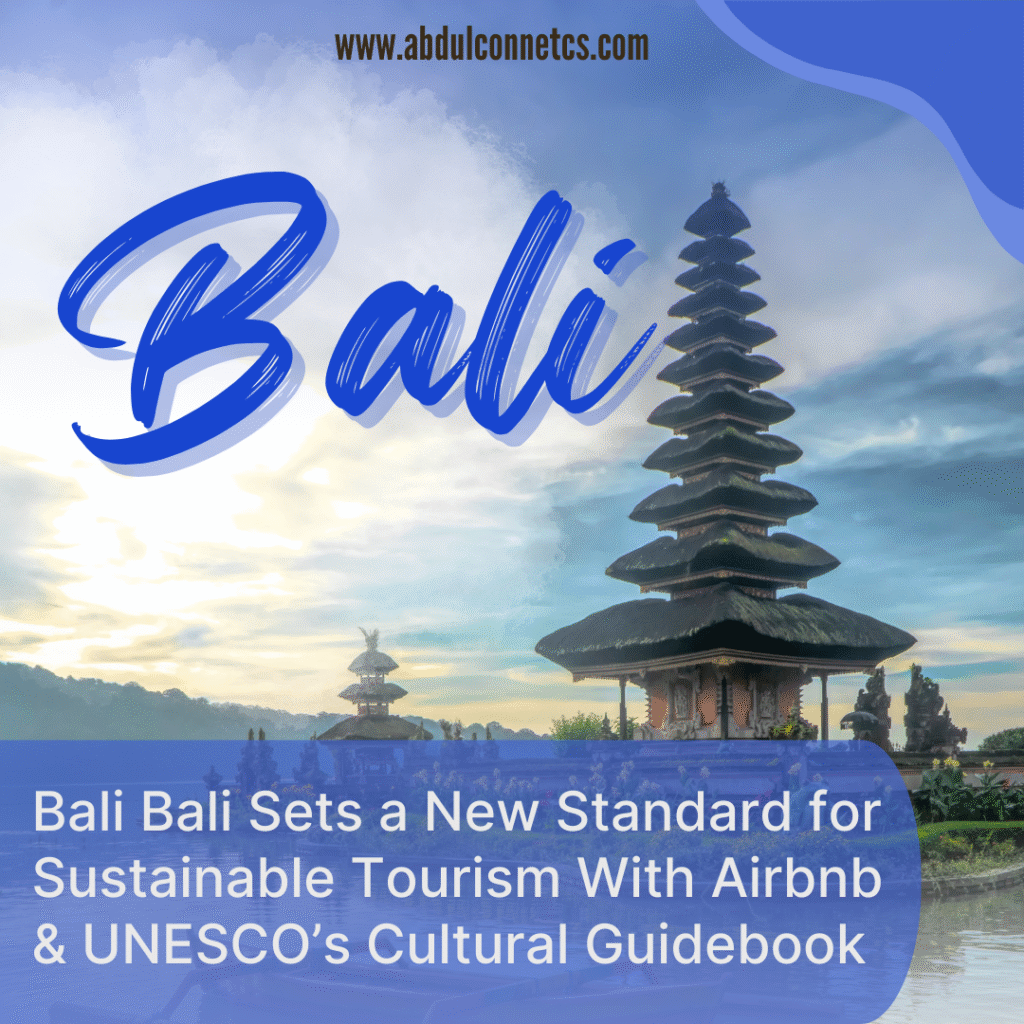
Bali, the “Island of the Gods,” is taking a bold step toward the future of responsible travel. In a groundbreaking collaboration, Airbnb and UNESCO have launched the Bali Cultural Guidebook, an initiative designed to preserve the island’s traditions, empower local communities, and promote conscious tourism.
This guidebook isn’t just another travel brochure—it’s a cultural roadmap that encourages visitors to experience Bali in a deeper, more meaningful way while helping local communities thrive.
A New Way to Explore Bali
Bali has long been a dream destination for travelers—famous for its temples, lush rice terraces, vibrant arts, and warm hospitality. But with its rising popularity, certain areas of the island have been overwhelmed by mass tourism.
That’s where the new Bali Cultural Guidebook comes in. Developed after months of cultural mapping by UNESCO researchers across five regions—Tabanan, Gianyar, Bangli, Buleleng, and Badung—the guidebook showcases Bali’s food traditions, sacred sites, handicrafts, and unique philosophies.
It empowers local Airbnb hosts to become cultural ambassadors, offering guests authentic experiences beyond the usual hotspots. Instead of just visiting, tourists are encouraged to truly connect with the island’s traditions and people.
The Heart of the Guidebook: Harmony With Nature and Spirit
At the center of this guidebook is the Balinese philosophy of Tri Hita Karana, which emphasizes harmony between people, nature, and the spiritual world. Visitors are encouraged to embrace this way of life, respecting both the environment and cultural heritage.
One highlight is the focus on Bali’s UNESCO-listed Subak irrigation system—an ancient, community-based water management system that sustains rice farming while preserving ecological balance. It’s not just farming; it’s a living example of how humans and nature can work together.
The guidebook also introduces sacred temples like Pura Ulun Danu Batur and Pura Taman Ayun, providing historical context and cultural etiquette so visitors can engage respectfully.
More Than Sightseeing: Supporting Communities
This initiative goes beyond preserving culture; it’s about sharing tourism benefits fairly across Bali. By guiding travelers toward less-visited regions, the guidebook helps reduce pressure on crowded areas while boosting rural economies.
Local artisans—such as Celuk silverworkers and bamboo weavers—get a chance to showcase their crafts. Farmers, food vendors, and small businesses also stand to gain from this shift, creating a more inclusive model of tourism.
Visitors will also find practical responsible travel guidelines—like how to dress at temples, respect local rituals, and minimize their footprint—ensuring their experience leaves a positive impact.
Why Bali Should Be on Your Travel List
Bali isn’t just beautiful—it’s one of the world’s best destinations for a blend of culture, adventure, and relaxation. Whether you’re wandering through terraced rice fields, diving into vibrant coral reefs, or experiencing a traditional dance ceremony, Bali offers something for every traveler.
It’s also an incredibly welcoming place. With its deep-rooted spirituality, artistic traditions, and stunning natural landscapes, Bali gives visitors the chance to experience travel that’s both rejuvenating and transformative.
3 Fascinating Things About Bali You Probably Didn’t Know
Home to Over 20,000 Temples
Bali is often called the “Island of a Thousand Temples,” but the actual number is closer to 20,000. Each village usually has at least three, making spirituality a living part of daily life.Unique Calendar System
Alongside the Gregorian calendar, Bali uses a 210-day Pawukon calendar, influencing everything from festivals to ceremonies. This means you’ll almost always stumble upon a celebration when visiting.Coffee with a Twist
Bali is famous for Kopi Luwak, one of the world’s rarest coffees. It’s made using beans that have been eaten and passed by a civet cat, giving it a unique flavor profile (and a very interesting backstory).
A Model for the World
With the launch of the Bali Cultural Guidebook, Airbnb and UNESCO are showing how tourism can respect local traditions, spread economic benefits fairly, and protect cultural heritage. It’s a model that could reshape the future of global travel.
For travelers, this means that visiting Bali is no longer just about beaches and sunsets—it’s about connecting with a way of life that values balance, respect, and sustainability.
So, whether you’re planning your first trip or a return journey, Bali isn’t just a destination—it’s an experience that stays with you.
